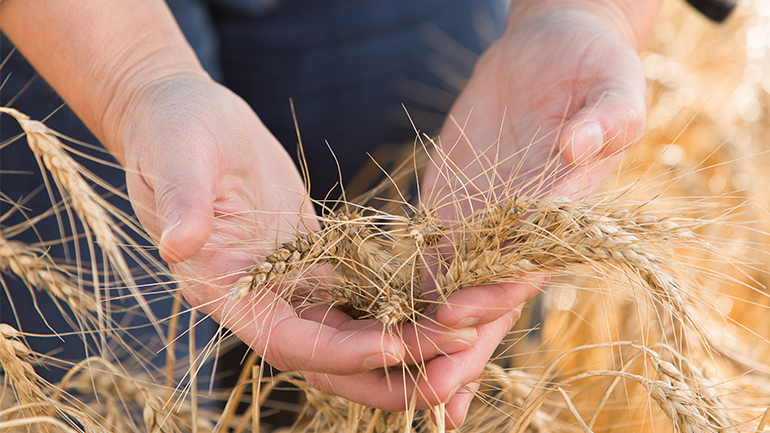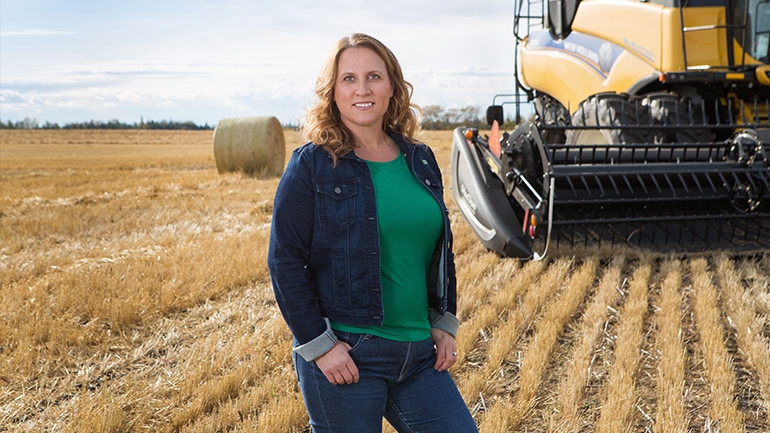Growing up, Nicole Stelter spent her evenings and weekends helping her family with swathing, field work, and taking care of cattle on the family's 2,500-acre grain and cattle farm in Nisku, Alberta.
Stelter is still an agricultural producer, but these days runs farm equipment during harvest alongside her husband on their 1,500-acre grain farm when she's not at her day job as Vice President of Agriculture Services at TD.
Stelter is one of a growing number of Canadian female leaders in the agriculture industry who are bringing new perspectives to the industry at a critical time amid trade tensions and fluctuations in domestic and international economies. According to the 2016 Census of Agriculture, female enrollment for courses focused on agriculture practices has increased. More female farm operators aged 40 years and under, in particular, are focusing their education on agricultural practices. In 2016, about 20% of female farm operators under 40 years of age reported taking agriculture-related studies, compared to over 8% of their counterparts aged 40 and older.
Two roles, one passion
And as the Canadian agriculture industry looks for new solutions in response to the above challenges—encouraging diversity in perspectives and supporting agricultural producers in order to help strengthen the industry is something Stelter says she is committed to advancing through her work at TD.
As part of TD's National Agriculture group, Stelter has had the opportunity to speak at conferences sponsored by the bank (such as the Advancing Women in Agriculture Conference) about TD's support of women in leadership roles, how the organization is supporting women in business, and as they make financial decisions that will impact their families. These events bring women together from all facets of agriculture across Canada, including producers, entrepreneurs and students in order to provide an opportunity for networking and learning. They also offer sessions on everything from financial management of business operations to work-life balance.
"When I started with the bank I wanted to work in the ag business because I wanted to give back to the industry that I grew up in. I wanted to help farmers grow their business and make them viable for the next generation," said Stelter, who has been with the bank since 1997. Stelter now leads a group of analysts, relationship managers and leaders who provide financial and business advice to agricultural producers. This support comes in the form of loans, investment opportunities, or help with succession planning.
"We form relationships and look at different ways to help support the growth and sustainability of a producer within the industry."
Last April, after helping a business in southern Alberta with succession planning and transition of their family business, Stelter was invited on a tour of the operation. As the previous owners (parents) retired, their sons and their sons' spouses had come to the bank interested in taking over the business but needed advice on how they could viably scale up.
"The previous owners had been TD clients for thirty years and our team wanted to provide support to help transition the business to the next generation," said Stelter. "And when the new owners gave me a tour they thanked me and my team for helping with the transition of the family business that will allow them to grow and make the business their own. You could just tell they were proud to be owners. Helping people this way leaves you with a sense of pride for sure."

The new face of farming
One of the things that Stelter admires about people in this industry, she said, is how connected and supportive they are of each other. Combined with the next generation of increasingly media-savvy millennials becoming involved—Stelter has noticed an explosion of niche resources including podcasts, seminars and even life coaches who are providing advice and support.
"I started looking into podcasts to expand my own knowledge about markets and innovations to help our operation and realized there is so much out there that isn't related to how I can market or produce product," said Stelter. She adds that her favourite podcast is by a city girl turned farmer who interviews other women in the industry on everything from how they achieve a work-life balance to farming practices to maintaining good mental health.
Women in the business, said Stelter, are really supporting each other through social media, regardless of whether they are small or large business owners or work in the industry outside of producing.
"We are seeing more husbands and wives making business decisions together or the female operator comes back to the family farm, saying 'I want to take this over,'" said Stelter, whose 19-year-old niece is in her second year of studying agricultural business marketing in college.
"The industry continues to change and evolve, so at the end of the day an organization wanting to support agriculture producers with advice has to be knowledgeable about their concerns," said Stelter. "As a bank we have to stay close to understanding their worries and what keeps them or people like me up at night as a business owner. The more we get to know and understand these businesses and the industry, the more we can help farmers succeed."
The next Advancing Women in Agriculture Conference will be taking place in Niagara Falls, ON from October 27-29, 2019.
